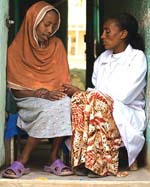Rationale for health education
In the previous section you have learned something about the concept of health education. In this section you will learn about the rationale for health education.
Read this quotation from Dr Hiroshi Nakajiima who was the Director-General of the World Health Organization.
'We must recognise that most of the world's major health problems and premature death are preventable through changes in human behaviours and at low cost. We have the know-how and technology, but they have to be transformed into effective action at the community level.'
From your experience in your own community do you think that he is correct? If so think of some examples from your own experience.
Examples might include the treatment cost and possible disability due to malaria, and think of the reduction to exposure to malaria by ITNs.
The rationale for health education is as follows:
- To address the spread of communicable and non-communicable diseases within the community where you are working using health education principles
- Health promotion and disease prevention are strategies to address the health problems in a cost-effective manner as compared to the cost spent for treatment
- Most health problems in developing countries are easily preventable through awareness creation and community involvement
- The cause of most health problems (for example, the spread of HIV/AIDS) is human behaviour and the way to prevent these health problems is also through influencing human behaviour
- In the community where you are working currently, health education is an instrument to help people with symptoms of disease to seek treatment
- Health education methods and principles are important to help to steer adolescent and young children away from harmful practices and behaviours like substance abuse, teenage pregnancy etc.
Read the list again. This important list outlines the rationale for health education activities. Which items on the list do you think will be the most important for you in your role as a health professional in your community?
In fact all these items are important and together they make up the rationale for making an effort in health education. Of course in some communities certain health issues are more important than others.
